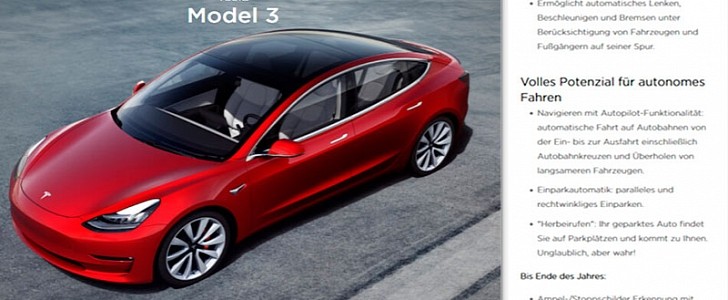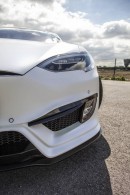With power comes great responsibility, or in Tesla's case, with massive popularity comes plenty of controversy. The U.S. carmaker is again being targeted for its apparently too-loose application of the term “Autopilot.”
Tesla is not a stranger to this debate. Even back in the U.S., several lawsuits filed against it have claimed that its use of the term “Autopilot” in advertising led drivers to assume the car was autonomous and, as such, pay no attention to the road. After all, what good is a self-driving car if you can’t let it drive itself without your intervention?
Legally speaking, Tesla is safe from such claims thanks to a note on the official website, which clearly states that cars with Autopilot are not autonomous and, consequently, require a human operator’s attention at all times. In Germany, at least, Tesla should be more careful about wording in marketing the vehicles, too, the Munich Regional Court has ruled.
Last year, non-profit industry group Wettbewerbszentrale, which counts on state support and lists some 1,200 companies and more than 800 chambers and business associations, filed an injunction against Tesla over the way Autopilot was advertised in the country. Specifically, they took issue with the fact that Tesla claimed the cars were “Autopilot inclusive,” had “full potential for autonomous driving” and that “by the end of the year: … automatic driving in town” would be possible.
According to a press release from the group, the verdict handed down on July 14 has determined that these particular phrases are “misleading” and, as such, Tesla is no longer able to use them to advertise its cars. Wettbewerbszentrale calls the verdict a first “victory.”
“Since autopiloted and autonomous driving at level 5 is currently neither legally permissible nor technically possible for the vehicle in question, Tesla must also adhere to the rules of the game and must not make false advertising promises,” Dr. Andreas Ottofülling, an attorney for the group, says in the same statement.
Tesla is yet to make a statement on the ruling (assuming it will ever make one), but Elon Musk being Elon Musk couldn’t help but say a few words on Twitter. If you guessed he wasn’t happy about it, you were right.
Legally speaking, Tesla is safe from such claims thanks to a note on the official website, which clearly states that cars with Autopilot are not autonomous and, consequently, require a human operator’s attention at all times. In Germany, at least, Tesla should be more careful about wording in marketing the vehicles, too, the Munich Regional Court has ruled.
Last year, non-profit industry group Wettbewerbszentrale, which counts on state support and lists some 1,200 companies and more than 800 chambers and business associations, filed an injunction against Tesla over the way Autopilot was advertised in the country. Specifically, they took issue with the fact that Tesla claimed the cars were “Autopilot inclusive,” had “full potential for autonomous driving” and that “by the end of the year: … automatic driving in town” would be possible.
According to a press release from the group, the verdict handed down on July 14 has determined that these particular phrases are “misleading” and, as such, Tesla is no longer able to use them to advertise its cars. Wettbewerbszentrale calls the verdict a first “victory.”
“Since autopiloted and autonomous driving at level 5 is currently neither legally permissible nor technically possible for the vehicle in question, Tesla must also adhere to the rules of the game and must not make false advertising promises,” Dr. Andreas Ottofülling, an attorney for the group, says in the same statement.
Tesla is yet to make a statement on the ruling (assuming it will ever make one), but Elon Musk being Elon Musk couldn’t help but say a few words on Twitter. If you guessed he wasn’t happy about it, you were right.
Tesla Autopilot was literally named after the term used in aviation. Also, what about Autobahn!?
— Elon Musk (@elonmusk) July 14, 2020















